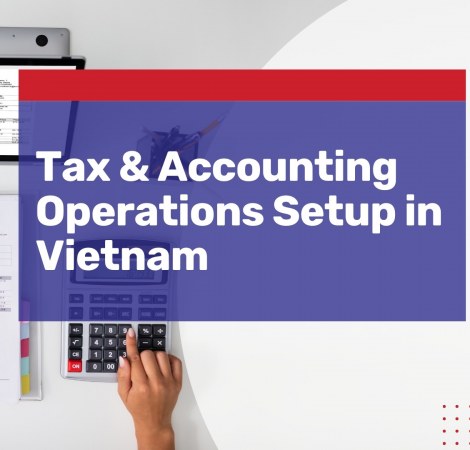While expanding one’s business in Vietnam, an investor should stay updated on the prevailing accounting and Taxes regulations and setup options. Failing to do so would have legal as well as financial repercussions. Thus, a foreign investor must keep abreast of the latest amendments in tax policies.
As you plan to set up your accounting and Taxes in Vietnam, you will also have to consider indirect taxes such as sales and use taxes, which vary between countries and could turn into a significant problem.
Looking for Tax & Accounting Operational Assistance? See our Accounting & Tax Services
Understanding the compliance clauses and different banking rules for a business to operate in a new country can feel overwhelming. Falling into the trap of misreading a compliance provision is relatively easy, which would incur your company huge penalties. Possible solutions to countering such problems, according to experts, is the automation of tax calculation and compliance regulations or outsourcing.
Tips on Setting Up your Accounting & Taxes when Expanding
Your company must establish parameters for managing taxes immediately after registration and exhibit financial readiness. You must maintain constant correspondence with your foreign counterpart to get regular updates and ensure the diligent adoption of local corporate practices. It would be advisable to work with your service provider on the following tasks:
- Outsourcing payroll management, accounting, and taxation
- Monitoring regular reports on VAT taxes and sales
- Outlining a plan to control risks
- Maintaining strong relationships with local banks
- Creating a practical strategy for cash repatriation
- Undertaking an extensive study on transfer pricing
Different Rates of Taxes on Corporate Income in Vietnam – what to know
In Vietnam, corporate taxes, especially for foreign companies, can offer various incentives for specific projects and/or business sectors. The detailed breakdown below can help you take advantage of the offers.
Standard rates
Several taxes are applicable at the national level. 20% is the average Corporate Income Tax (CIT) rate. CIT rates are further subject to certain conditions as well as the location of the project. Here is a list of CIT rates imposed on different kinds of enterprises:
Non-standard Rates
| Enterprises | CIT Rates |
| Oil & Gas Industry | 32% to 50% |
| Extraction of mineral resources (gemstones, gold, and silver) | 40% or 50% |
Effective April 2021, the government issued Decree 52/2021 to provide much-needed support to those industries directly hit by COVID-19. If your business venture is in Vietnam, it will be subject to CIT apart from being taxed on their global income. There is no place for any tax incentives in such a case.
The companies established in Vietnam without a legal foothold count as foreign contractors, regardless of their operations unfolding within or outside the country. Such foreign organizations are subject to Foreign Contractor Tax (FCT), which further incorporates the Value-Added Tax (VAT) and Corporate Income Tax (CIT).
Preferential rates
Reduced tax rates such as 10%, 15%, and 17% are applicable for those firms that meet specific terms and conditions. Organizations undertaking sizable investment projects or companies in the field of R&D can avail such exceptional tax privileges.
Calculation of taxable profit
The difference between the total revenue (irrespective of foreign or domestic base and expenditures) and other accessible deductible incomes is known as taxable profit. As a foreign investor, you are to file your CIT every year.
Local income taxes
State, local or provincial income tax is not applicable in Vietnam.
Outsourcing Tax & Accounting needs in Vietnam
Maintaining an annual audit report can seem daunting. It incorporates records like personal as well as commercial taxes, balance sheets, and equity/profit/loss statements. These records must comply with the latest developments in clauses announced by the government. Such a task would need a separate department with further investments. In this case, a commonly recommended solution to address your accounting needs is outsourcing. Here are a few benefits of outsourcing your tax and accounting needs:
- Outsourcing saves you time and helps you focus on other issues, such as the firm’s day-to-day transactions and obtaining new clients.
- Outsourcing can reduce overhead costs such as the expenditures done on hiring or training new employees and acquiring hardware, software, and office supplies.
- You will have access to a pool of professionals trained in the given field with years of experience without spending much time on human resources tasks such as recruitment or payroll management.
- With a foreign service provider, operation scalability dramatically improves as there are sets of resources for any desired role in your accounting system.
- Outsourcing can also minimize the risks of miscalculation or delays.
Source: Cekindo Outsourcing Guide
About Us
InCorp Vietnam is a leading provider of global market entry services. We are part of InCorp group, a regional leader in corporate solutions, that encompasses 8 countries in Asia-Pacific, headquartered in Singapore. With over 1,100 legal experts serving over 15,000 Corporate Clients across the region, our expertise speaks for itself. We provide transparent legal consulting, setup, and advice based on local requirements to make your business perfectly fit into the market with healthy growth.
Don’t take our word for it. Read some reviews from some of our clients.
